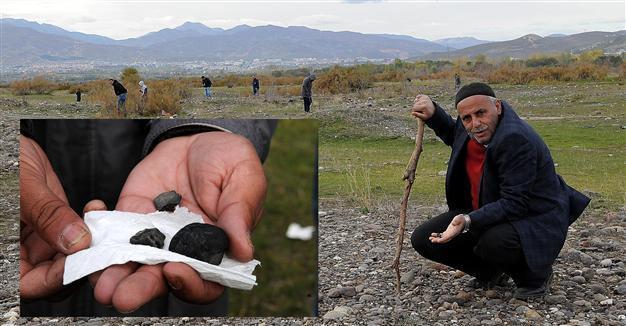Finance minister says ‘no’ to meteorite tax in Turkey’s east
ANKARA/BİNGÖL

AA Photos
After discussions both on traditional and social media, including a Twitter poll by the country’s finance minister and an official investigation, it has been decided villagers in the eastern province of Bingöl who found and sold meteorite pieces at inflated prices did not need to pay taxes for this sort of income.Turkish Finance Minister Mehmet Şimşek took to Twitter to seek the public’s opinion on the move to tax locals selling meteorite fragments in Bingöl’s Sarıçiçek village.
“Should the meteorites sold in Sarıçiçek be taxable? What do you think?” the minister tweeted alongside a two-answer survey.
Some 72 percent of a total of 30,400 participants said “no” to the minister’s question on Nov. 20, when Şimşek began an official investigation.
“As any commercial organization was not established by local people in Bingöl, they do not need to pay any taxes for their income from selling the meteorites. Other people who have flocked to the city, however, need to pay the taxes as they are there for commercial reasons,” said Şimşek.
The debate over taxation began after the Finance Ministry dispatched officials to conduct tax inspections after villagers in Bingöl sold a number of meteorite fragments they had discovered, though the villagers fiercely objected to the move and said the meteorites were “sent by God.”
Officials arrived at the village of Sarıçiçek to investigate after media reports emerged about villagers selling meteorite pieces for up to $200,000 to collectors from Russia and Europe.
All sales worth more than 21,000 Turkish Liras ($7,000) are subject to taxation.
The local villagers objected to the ministry’s move, arguing the meteorites could not be considered natural wealth because they were “sent from above.”
“God sent them from the skies. They should be exempt from tax,” a villager named Rıdvan Ergün told Doğan News Agency.
“They said the stones belong to the state. But we did not extract them from the ground. Taxes should only be imposed on [stones] extracted from the ground,” Ergün added.
Another villager said locals were not involved in trade, as the revenue from the meteorites was used to pay debts.
“It is true that the villagers gathered the stones. But they did not trade them; they only paid their debts,” İsmail Ergün claimed. “We did not establish companies or hire people to look for stones. We just gathered a few stones. We don’t believe that should be taxable.”
The residents of Sarıçiçek began to sell the pieces they found after being told by an Istanbul university academic how valuable the meteorites were.
They said they had sold meteorite pieces for up to $60 per gram.
“God willing, everybody should find this stone. Poor people keep looking for it. They need it more than we do,” one local said.
According to Oxford University Astrophysics Prof. Selçuk Topal, meteorites are mainly important for research purposes.
“The reason people worldwide are interested in the meteorite pieces found in Bingöl is for scientific tests in space research,” Topal told Cihan News Agency.
















